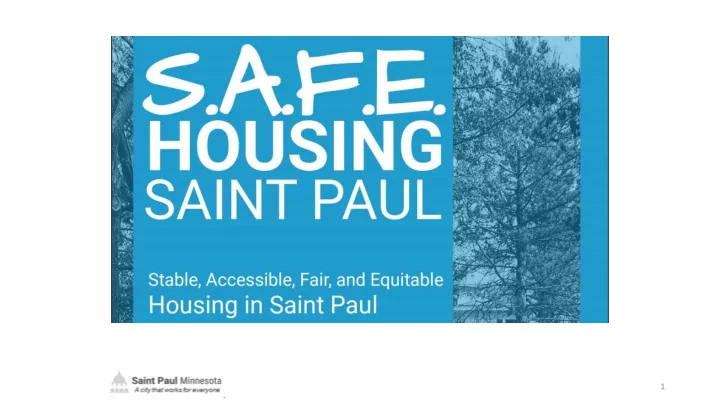

1
City of Saint Paul Commitment to Fair Housing 2017-2018 2
Summer/Fall 2019 Stakeholder Engagement Increase knowledge about Increase housing stability and tenants rights and decrease displacement responsibilities Tenant Protections Increase housing access and Increase community input decrease barriers and engagement 14 City-led 801 Engaged Community Feedback 283 People Events Inputs 3
4
Inputs National Landscape Coalitions Council Analysis of Research Impediments Community Events Council Resolution City Engagement Fair Housing Work Group Report Fair Housing Policy Agenda 5
Rights and Responsibilities Why do we need a local Tenant-Landlord Information Packet? Many tenants are unaware of their housing rights and responsibilities. Information regarding tenant rights are often difficult to access, in multiple locations, or hard to understand. Creating this resource will aid in a clearer shared understanding between landlords and tenants on rights, responsibilities, and resources available to support better communication and resolution related to landlord-tenant issues. Goal: Inform tenants and landlords of their rights, responsibilities, and available resources. Policy details: Compilation of relevant city ordinance, state statute, and federal laws regarding landlord and tenants’ rights, responsibilities, and resources. Packet and Poster • Easy to read • Multiple Languages 7
Security Deposits Why do we need a limit on the upfront costs of housing? Minnesota currently does not have any restrictions on the amount a housing provider can charge for a security deposit or prepayment. Requiring large security deposits and/or rent prepayments creates an additional financial barrier for residents who have lower but steady incomes to accessing rental housing. Goal: Limit the upfront costs of accessing rental housing. Policy details: City would set requirements regarding maximum amounts allowable as security deposits and prepaid rent required to move in. • Security Deposit can equal up to One (1) months' rent • Prepaid rent cannot exceed One (1) months' rent • Additional Security Deposit OR Prepayment allowable for applicants who could otherwise be denied under the Uniform Screening Guidelines • Does not include application fees and/or pet deposits. 8
Tenant Screening Why do we need tenant screening guidelines? Tenant selection criteria is a crucial piece of fair housing work. Property owners create and utilize tenant selection criteria to screen tenants and assess risk often based on criminal history, rental history, and credit score. Lack of regulation in this space has resulted in residents who are disproportionately impacted by the disparities in our criminal justice system and predatory financial systems being denied access to rental housing. Goal: Increase housing access and mobility for persons with backgrounds negatively impacted by criminal, credit, and rental histories Policy details: Establish uniform screening criteria that will: • Limit the impact of criminal history • Prohibit the use of Petty Misdemeanors and traffic offenses • Misdemeanors – 3 year lookback • Felonies – 7-10 year lookback • Limit the impact of rental history • Evictions – 3 year lookback • Consider additional income to rent payment standards • Prohibit the use of credit scores • May use relevant credit information (money owed to previous landlord or utility company) 9
Just Cause Notice Why do we need a Just Cause Notice? In many cities and states, landlords can non-renew or terminate tenancy without providing the tenant with any information. As a result, landlords can refuse to renew a tenant’s lease for any reason or for no reason. Goal: Prevent housing displacement without cause and increase housing stability. Policy details: City would require landlords to give written reason for non- renewal or termination of tenancy that aligns with one of ten established Just Causes: • Non-payment of rent • Repeated late payment of rent • Material non-compliance • Refusal to renew • Occupancy by property owner or family member • Building demolishment and dwelling unit conversion • Rehab and renovation • Complying with a government order to vacate • Occupancy conditioned on employment • Exceeding Occupancy 10
Advance Notice of Sale Why do we need and Advance Notice of Sale Policy: The Advance Notice policy provides information earlier in the sales process to two key stakeholders: preservation buyers and tenants. Engaging preservation buyers earlier in the process strengthens the City’s NOAH preservation efforts by creating more opportunities for preservation buyers. Notifying tenants ensures they are informed and can prepare for any potential changes to the status of their housing. Goal: Support preservation of affordable housing and increase protections for tenants potentially facing displacement. Policy details: Require property owners of affordable buildings to give notice to the City & tenants in advance of a proposed sale as well as after a change in ownership. Establish a tenant protection period to minimize displacement. Properties covered by this policy as proposed: • All rental properties • 20%+ of units affordable • Affordable=80% AMI or below • 90-day advance notice period • 90-day tenant protection period 11
Tenant Protections Implementation Committee (TPIC) S.A.F.E. Housing Saint Paul will be effective on March 1, 2021. In advance of the effective date, the City will convene an implementation committee to support policy education, outreach and engagement across stakeholder groups. In partnership with Office of Financial Empowerment (OFE) staff, the TPIC will offer their experience and expertise in relation to the following objectives: • Scope and define goals, key measurables and deliverables for successful implementation • Inform the policy rulemaking process for S.A.F.E. Housing Saint Paul as adopted • Support the creation of guidance and operationalization documents • Support the creation of training modules and webinar content • Inform and design a comprehensive engagement strategy • Monitor the effectiveness of implementation activities and initiatives prior to policy effective date. The TPIC will function as an ad hoc committee convened to support outreach, education and engagement related to the implementation of S.A.F.E. Housing Saint Paul. Committee members will serve for a term of 7 months (September 2020-March 2021). 12
Questions?
Recommend
More recommend